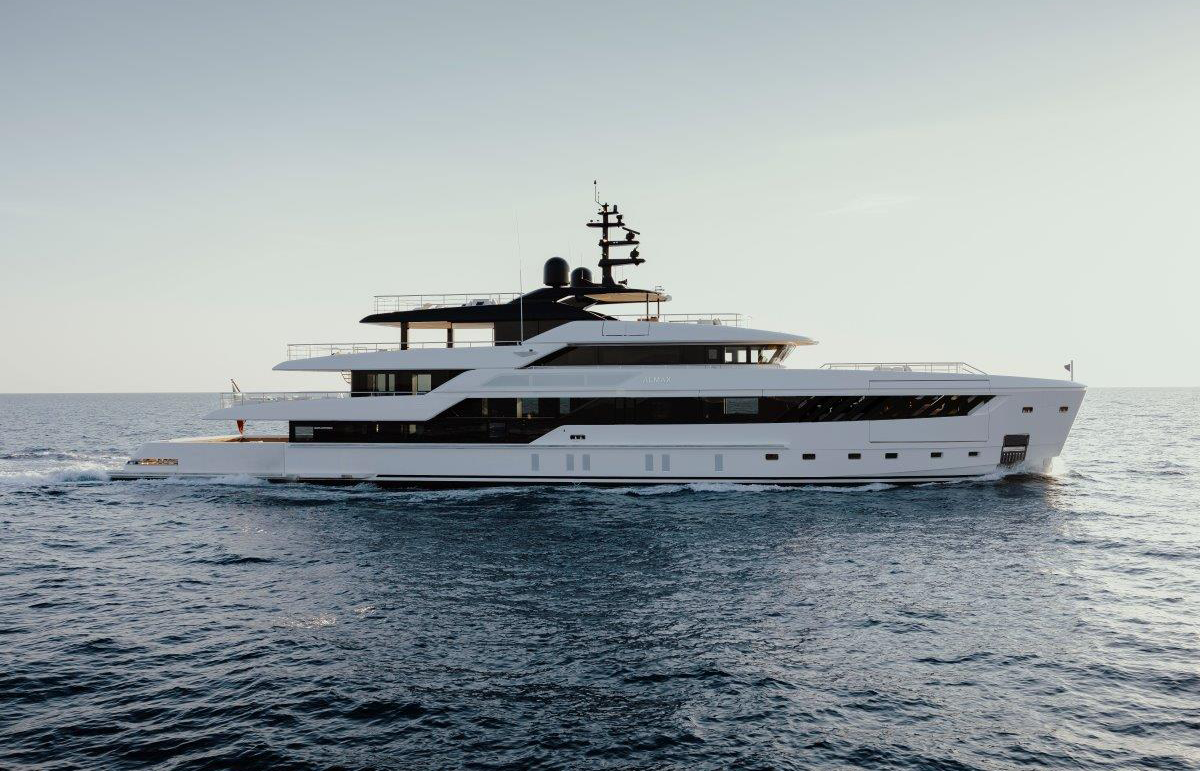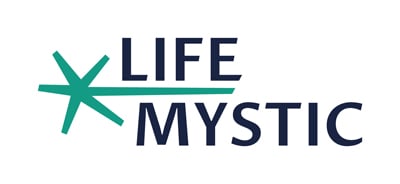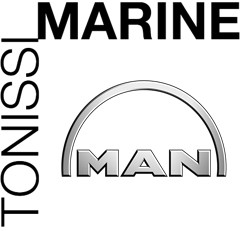
LIFE MYSTIC - Methanol for Yachting Sustainable energy Transition applied to Internal Combustion engines
The LIFE MYSTIC project aim is to test propulsion engines and generators fueled by a combination of diesel and methanol onboard of a Sanlorenzo superyacht, otherwise presently powered 100% by diesel fuel.
Member States of the International Maritime Organization (IMO), meeting at the Marine Environment Protection Committee (MEPC 80) in July 2023, decided to adopt the 2023 IMO Strategy on Reduction of GHG Emissions from Ships. According to IMO strategy, net-zero GHG emissions in the maritime sector should be reached in 2050 and no more in 2100 like in the previous regulation. Sanlorenzo decarbonisation strategy aims to reach net-zero GHG emissions almost 10 years before. It’s worth to mention here that this ambition is also in line with the Fit for 55 package defined by the EU Green Deal that aims to reduce the EU’s emission by 55% in 2030 compared to a 1990 baseline.
Actually, maritime transportation is very relevant in terms of GHG emissions since 90% of world trade is developed using this transport mode. There are nearly 100000 ships in operation at global level, and more than 300 Mt of fuel is consumed annually.
To reduce shipping emissions and comply with the IMO emission rules and regulations, there are various technologies and methods, including engine retrofitting with after-treatment systems and the adoption of low carbon or zero carbon fuels. Methanol (MeOH) is one of the promising alternative fuels for future maritime transportation. It is liquid at environmental temperature and it is already available in more than 100 ports at global level. If produced by renewable energy sources methanol becomes a carbon neutral fuel, supporting net-zero GHG emissions strategy.
Availability of methanol around the world is a must for the Life Mystic project as long as a boat that cannot refill methanol tanks in major locations is not well received from the market. Renewable methanol availablility is thus needed by the project to prove to the world that strong CO2 and other pollutants emission reduction can be achieved with this solution.
According to the statistics published by the Methanol Institute a huge number of production plants is in construction and a good number is in its design phase. Production of renewable methanol (bio+E) in 2024 will amount to 0.8 Mt, with an increase of 60% versus 2023 production. In 2025 an increase of nearly 8 times is expected with a number of new plants starting production.
Methanol use for propulsion in 2-stroke low speed engines has already been investigated on large vessels (i.e. container cargos) while methanol applications in 4-stroke low speed engines are under investigation in the field of engines manufacturing industry (i.e. Man and Wärtsilä) for other maritime applications (not already tested on yachts and superyachts). A Sanlorenzo superyacht has been selected for this project where 2 MAN four-stroke high speed diesel engines in partnership with Ranieri Tonissi as development partner and 2 four-stroke diesel generators developed by Nanni Industries will be retrofitted for onboard bi-fuel operation.
Designing a retrofit kit for bi-fuel engines involves a careful engineering process to ensure the efficient and reliable combustion of two different types of fuels within a single engine, while ensuring a smooth and flawless transition to diesel only operation at any time, making this engines a perfect solution for a transitional market. The design will take into consideration the following aspects:
Bench test campaigns will ensure reliability and effectiveness of the design and manufacturing of the prototypes to be installed onboard.
The design of the ship will be updated by Sanlorenzo with the transformation of two tanks from traditional diesel design to a methanol design, in fulfilment of the applicable regulations, and fuel distribution plant will be integrated with the additional lines and devices to complete the bi-fuel transformation of the ship design.
Impact of the project:
Reduction of GHG emission: 150 t/y CO2eq
Reduction of primary fossil energy consumption: 700 MW h/y
Reduction air quality contaminants: 630 kg/y
Reference: LIFE23-ENV-IT-LIFE MYSTIC/ 101148420
Acronym: LIFE23-ENV-IT-LIFE MYSTIC
Total Costs: 4.817.889,00
Total EU Contribution: 2.890.733,40




Funded by the European Union. Views and opinions expressed are however those of the author(s) only and do not necessarily reflect those of the European Union or the European Education and Culture Executive Agency (EACEA). Neither the European Union nor EACEA can be held responsible for them.
The LIFE MYSTIC project aim is to test propulsion engines and generators fueled by a combination of diesel and methanol onboard of a Sanlorenzo superyacht, otherwise presently powered 100% by diesel fuel.
Member States of the International Maritime Organization (IMO), meeting at the Marine Environment Protection Committee (MEPC 80) in July 2023, decided to adopt the 2023 IMO Strategy on Reduction of GHG Emissions from Ships. According to IMO strategy, net-zero GHG emissions in the maritime sector should be reached in 2050 and no more in 2100 like in the previous regulation. Sanlorenzo decarbonisation strategy aims to reach net-zero GHG emissions almost 10 years before. It’s worth to mention here that this ambition is also in line with the Fit for 55 package defined by the EU Green Deal that aims to reduce the EU’s emission by 55% in 2030 compared to a 1990 baseline.
Actually, maritime transportation is very relevant in terms of GHG emissions since 90% of world trade is developed using this transport mode. There are nearly 100000 ships in operation at global level, and more than 300 Mt of fuel is consumed annually.
To reduce shipping emissions and comply with the IMO emission rules and regulations, there are various technologies and methods, including engine retrofitting with after-treatment systems and the adoption of low carbon or zero carbon fuels. Methanol (MeOH) is one of the promising alternative fuels for future maritime transportation. It is liquid at environmental temperature and it is already available in more than 100 ports at global level. If produced by renewable energy sources methanol becomes a carbon neutral fuel, supporting net-zero GHG emissions strategy.
Availability of methanol around the world is a must for the Life Mystic project as long as a boat that cannot refill methanol tanks in major locations is not well received from the market. Renewable methanol availablility is thus needed by the project to prove to the world that strong CO2 and other pollutants emission reduction can be achieved with this solution.
According to the statistics published by the Methanol Institute a huge number of production plants is in construction and a good number is in its design phase. Production of renewable methanol (bio+E) in 2024 will amount to 0.8 Mt, with an increase of 60% versus 2023 production. In 2025 an increase of nearly 8 times is expected with a number of new plants starting production.
Methanol use for propulsion in 2-stroke low speed engines has already been investigated on large vessels (i.e. container cargos) while methanol applications in 4-stroke low speed engines are under investigation in the field of engines manufacturing industry (i.e. Man and Wärtsilä) for other maritime applications (not already tested on yachts and superyachts). A Sanlorenzo superyacht has been selected for this project where 2 MAN four-stroke high speed diesel engines in partnership with Ranieri Tonissi as development partner and 2 four-stroke diesel generators developed by Nanni Industries will be retrofitted for onboard bi-fuel operation.
Designing a retrofit kit for bi-fuel engines involves a careful engineering process to ensure the efficient and reliable combustion of two different types of fuels within a single engine, while ensuring a smooth and flawless transition to diesel only operation at any time, making this engines a perfect solution for a transitional market. The design will take into consideration the following aspects:
- the engine methanol distribution;
- the methanol injection system to precisely control the injection into intake ports of each cylinder with proper timing and quantity;
- the alignment of existing diesel injection system with additional fuel in the mixture;
- the ignition system: Diesel/methanol engines will use compression ignition given by the two fuels (diesel and methanol respectively), where diesel is acting as pilot fuel.
Bench test campaigns will ensure reliability and effectiveness of the design and manufacturing of the prototypes to be installed onboard.
The design of the ship will be updated by Sanlorenzo with the transformation of two tanks from traditional diesel design to a methanol design, in fulfilment of the applicable regulations, and fuel distribution plant will be integrated with the additional lines and devices to complete the bi-fuel transformation of the ship design.
Impact of the project:
Reduction of GHG emission: 150 t/y CO2eq
Reduction of primary fossil energy consumption: 700 MW h/y
Reduction air quality contaminants: 630 kg/y
Reference: LIFE23-ENV-IT-LIFE MYSTIC/ 101148420
Acronym: LIFE23-ENV-IT-LIFE MYSTIC
Total Costs: 4.817.889,00
Total EU Contribution: 2.890.733,40




Funded by the European Union. Views and opinions expressed are however those of the author(s) only and do not necessarily reflect those of the European Union or the European Education and Culture Executive Agency (EACEA). Neither the European Union nor EACEA can be held responsible for them.
